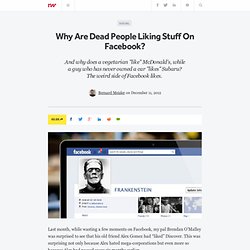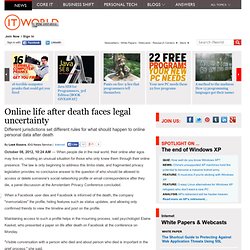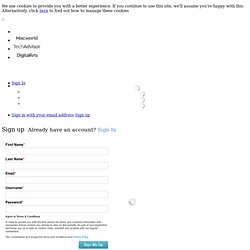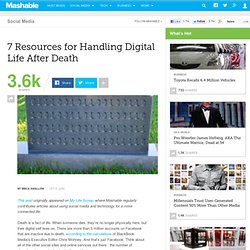

Why Are Dead People Liking Stuff On Facebook? Last month, while wasting a few moments on Facebook, my pal Brendan O’Malley was surprised to see that his old friend Alex Gomez had “liked” Discover.

This was surprising not only because Alex hated mega-corporations but even more so because Alex had passed away six months earlier. The Facebook “like” is dated Nov. 1, which is strange since Alex “passed [away] around March 26 or March 27,” O’Malley told me. Worse, O’Malley says the like was “quite offensive” since his friend “hated corporate bullshit.” Here's a screenshot: Brendan sent me this info in response to a request I had made on Facebook to my friends. When I contacted these people they swore they had never liked these brands, and they had no idea that this stuff was going out under their names. So what is going on? The Mystery Of The Unintended Likes Full disclosure: I’m an active Facebook user, and I really enjoy it. Many people find promoted posts egregious, and the blowback has been well documented. The Plot Thickens Fair enough. Privacy after death. The Economist explains: Who owns your data when you're dead?
Oregon proposal, FB after death. What (Legally) Happens to Our Social Media Accounts When We Die? Woman Sues Google Over Dead Blogger's Allegedly Defamatory Comme. Life and Death Online and Facebook: Who Controls a Digital Legacy? Online life after death faces legal uncertainty. October 08, 2012, 10:24 AM — When people die in the real world, their online alter egos may live on, creating an unusual situation for those who only knew them through their online presence.

The law is only beginning to address this limbo state, and fragmented privacy legislation provides no conclusive answer to the question of who should be allowed to access or delete someone's social networking profile or email correspondence after they die, a panel discussion at the Amsterdam Privacy Conference concluded. When a Facebook user dies and Facebook is informed of the death, the company "memorializes" the profile, hiding features such as status updates, and allowing only confirmed friends to view the timeline and post on the profile.
Maintaining access to such a profile helps in the mourning process, said psychologist Elaine Kasket, who presented a paper on life after death on Facebook at the conference on Monday. Online life after death faces legal uncertainty. When people die in the real world, their online alter egos may live on, creating an unusual situation for those who only knew them through their online presence.

The law is only beginning to address this limbo state, and fragmented privacy legislation provides no conclusive answer to the question of who should be allowed to access or delete someone's social networking profile or email correspondence after they die, a panel discussion at the Amsterdam Privacy Conference concluded. When a Facebook user dies and Facebook is informed of the death, the company "memorializes" the profile, hiding features such as status updates, and allowing only confirmed friends to view the timeline and post on the profile. Maintaining access to such a profile helps in the mourning process, said psychologist Elaine Kasket, who presented a paper on life after death on Facebook at the conference on Monday.
But while that may be important to Facebook friends, the family might think otherwise. Is LinkedIn losing momentum in the Social Media race? 7 Resources for Handling Digital Life After Death. This post originally appeared on My Life Scoop, where Mashable regularly contributes articles about using social media and technology for a more connected life.

Death is a fact of life. When someone dies, they're no longer physically here, but their digital self lives on. There are more than 5 million accounts on Facebook that are inactive due to death, according to the calculations of BlackBook Media's Executive Editor Chris Mohney. And that's just Facebook. Think about all of the other social sites and online services out there - the number of abandoned accounts due to death must be enormous.
After someone passes away, their digital assets live on in the form of computer files and data online. Here are seven services that help manage a digital life after death. 1. Entrustet is a free service that enables an account holder to pass on digital assets to up to 10 designated heirs and one executor, who is in charge of executing a person's digital wishes after they pass away. 2. 3. 4. What Happens to Your Facebook Account When You Die?